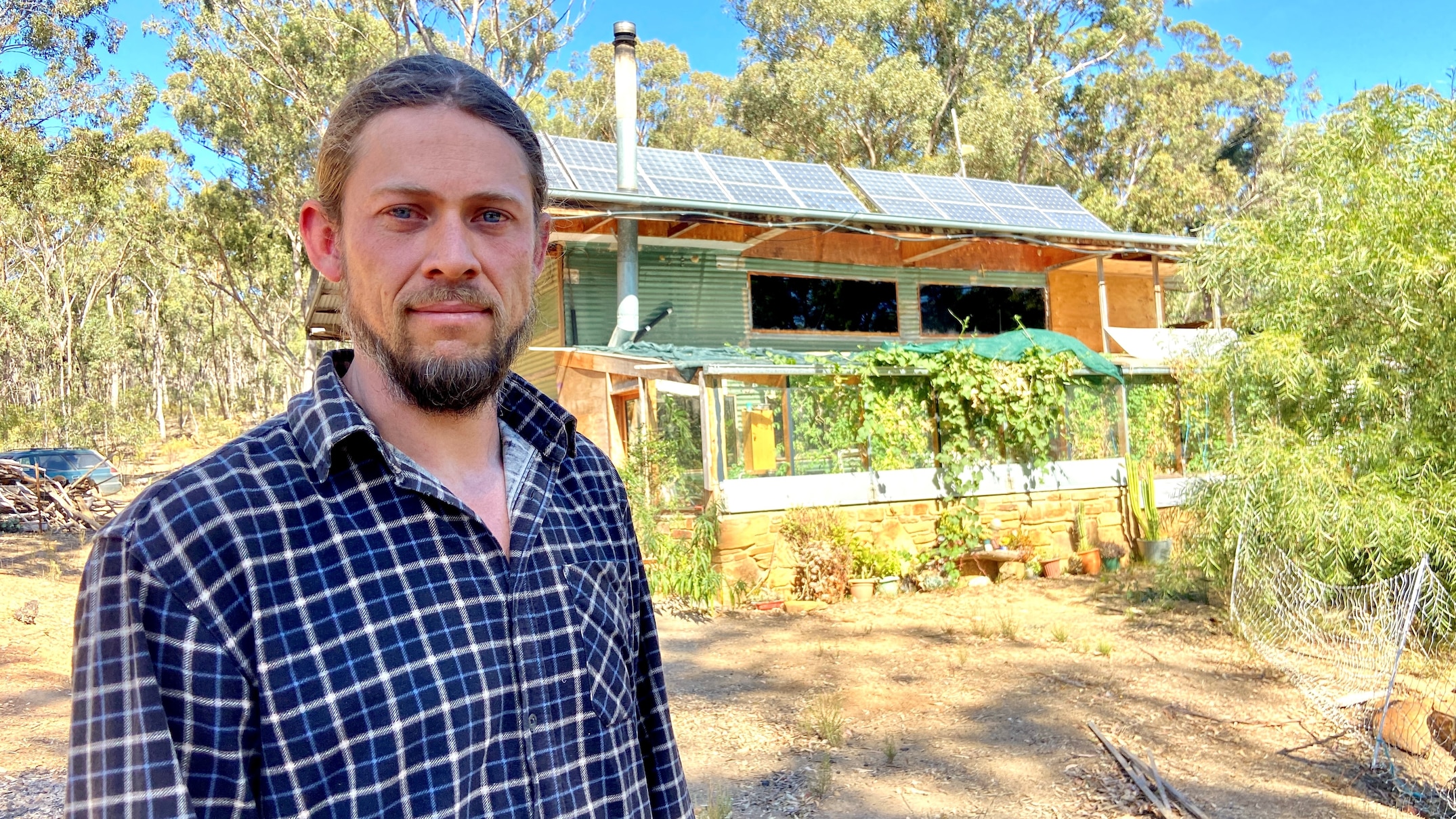
Oliver Holmgren has only had one power outage since he installed his off-grid system in 2017. (ABC Central Victoria: Shannon Schubert)
Self-described “Jack of all trades” Oliver Holmgren watched a lot of YouTube videos before he transformed his little cottage into a self-sufficient home.
Sipping chai tea in the Fryers Forest ecovillage in Central Victoria, the self-taught technical engineer said he was driven to be more resilient.
“So I can respond to whatever is around the corner,” he said.
Mr Holmgren has been living off-grid since 2017, designed and built three off-grid solar home systems, and helped a dozen locals install their own systems.
His off-grid system consists of 24 rooftop solar panels and a 10kW lithium battery.
What exactly does off-grid living involve?
An estimated 2 per cent of Australian properties are off-grid, mostly in regional and remote areas.
Amid an increasing number of extreme weather events and recent power outages, experts predicted this number would only rise.
“There is a strong impetus to do it in rural areas, where the quality of electricity supply is problematic and, in both winter and bushfire seasons, it is an issue,” said Professor Bruce Mountain, director of the Victoria Energy Policy Centre.
“It’s becoming more possible and financially attractive for households to self-supply.”
Mr Holmgren has a small home and uses an average of 5kW per day.
According to the Australian Energy Regulator’s latest annual retail markets report, the average daily electricity use for an Australian household is 16kWh.
Mr Holmgren said since 2017 he has had just one power outage, which he was able to fix in about half an hour.
But he admitted off-grid living had its obstacles.
“Financially it can be significant. If you want to do all your cooking, that might cost you an extra $20,000 in batteries,” he said.
“Batteries are the weakest link.”
From kerosene lamps to solar panels
Erik Christiansen’s family home has been off-grid for 60 years.
On the outskirts of Munro, in Victoria’s east, the original cement cottage was once reliant on diesel generators, candles, and kerosene lamps.
Today it is fitted with a state-of-the-art solar-powered battery system.
“I added an extension and put on a roof that is slanted at 40 degrees to capture the maximum winter sun,” Mr Christiansen said.
Through a combination of data sheets and YouTube videos, the retired electrical engineer designed his own solar-powered battery system.
Costing $74,000, there are a total of 65 solar panels on the property’s roof, which feed into a 46kW battery system.
The 70-year-old said he used up to 36kW of power a day.
“From having no power at all in the daytime, we’ve got an electrical vehicle charging with 6.5kW and we’re putting 2.5kW into the hot water service at the same time — and we’ve still got spare capacity.”
Off-grid systems ‘increasingly mainstream’
Professor Mountain said it had become more viable for many residents, especially in rural areas, to go off-grid.
“Fifteen years ago, it was eclectic little communities but it’s becoming increasingly mainstream,” he said.
Professor Mountain said concerns about the reliability of the main grid, as well as the increasing affordability of rooftop solar and batteries, had contributed to a rise in people going off-grid.
“It’s not yet an easy switch-over for most, but it is increasingly a possibility,” he said.
He said one of the biggest barriers to going off-grid was the demand for winter heating.
“Customers who can figure out ways to meet their heating demands, without the use of electricity, or better insulate their homes, find it easier to disconnect from the grid.”
Going off-grid ‘not for wimps’
Despite being a big advocate for sustainable living, Mr Christiansen admitted it was not for everybody.
“Off-grid is not for wimps,” he said.
“You’ve got to go one of two ways … either you’d have to live like a hermit and not use much power, or you have to spend quite a bit of money.
“It’s just too damn expensive for a lot of people.”
Mr Christiansen said his late father, a labourer who built the original cement cottage with his own hands, would be proud.
“I think he would be gobsmacked,” he said.
“He would be a little disappointed that he couldn’t have done it, but the technology wasn’t there, and he was raising a family of seven … we didn’t have a lot of money.”
News Related-
High court unanimously ruled indefinite detention was unlawful while backing preventive regime
-
Cheika set for contract extension as another Wallabies head coaching candidate slips by
-
Analysis-West's de-risking starts to bite China's prospects
-
'Beyond a joke' Labor won't ensure PTSD protections: MP
-
Formula One season driver ratings: Lando Norris shines as Max Verstappen nears perfection
-
Catalina golfer Tony Riches scores Guinness World Record four holes in one on same hole
-
Florida coach Billy Napier fires assistants Sean Spencer, Corey Raymond with expected staff shakeup ahead
-
Rohingyan refugee NZYQ accidentally named in documents published by high court
-
Colorado loses commitments of 2 more high school recruits
-
Queensland Health issues urgent patient safety alert over national bacteria outbreak
-
Townsville Community Pantry 'distressed' by fruit, vegetable waste at Aldi supermarket
-
What Is The Beaver Moon And What Does It Mean For You?
-
Labor senator Pat Dodson to resign from politics due to health issues
-
Hamas releases 11 more hostages, as Israel agrees to extend ceasefire
